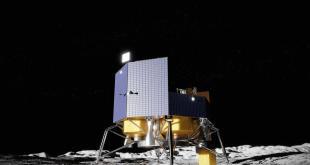
by Luisa Low
During this week’s Space Café, SpaceWatch.Global publisher, Torsten Kriening spoke with a Member of the European Parliament and member of the German Alliance 90/The Greens party, Niklas Niennas, about Europe’s role and response to the space race 2.0.
Elected in 2019, he is a member of the committees on regional development, culture and education, however, he also takes great interest in space, with 20 percent of his workload dedicated to space policy. He also regularly writes about the sector on his blog and has hosted webinars on space law and policy, and the current upheavals facing the sector.
This week, he and Torsten discuss how Europe can prepare for a new space world that’s both brimming with private sector players and is increasingly militarised, through the creation of an international rulebook and European space strategy.
One law to rule them all and one agency to bind them?
Although Europe has many competencies when it comes to space, compared to the United States and China, it has taken a fairly passive role in advocating for them.
But now with nations battling over orbital territory through new “space forces” and the rush of companies jumping in the ring to capitalise on the great leap into space 2.0, Niklas believes Europe can do better to stick up for its own interests.
Currently, the European Union comprises 27 nations, each with varying forms of government and space policies, however not every member state is part of the European Space Agency, which also counts the United Kingdom as a member.
One idea Niklas floats is whether, instead of having each member country update or create their own legal framework for dealing with space, it would be more productive – and stronger – for the European Union to draft one universal space law that governs the activities of its member countries.
But, even within the European Union, there are competing interests and varying objectives, so how do you get the EU, ESA, DLR and all the other companies, nations and governments to play as one?
Niklas believes, as a first step and to strengthen the interests of its member countries, the European Union should create its own space agency rather than amalgamating itself with the European Space Agency, the latter of which could potentially leave out EU countries who are not members.
“We still need a European Union space agency to ensure that we have a cohesive strategy. I think so that DLR and the other national member states’ space agencies can find their place as well.”
Recovering from COVID-19 through space investment
In the next 7 years, the European Union will spend €2 trillion as part of its COVID-19 economic recovery package.
Already, there are significant projects underway to reinvigorate Europe’s economy and fight climate change through large scale infrastructure and measures, such as the Green Deal. However, Niklas believes any plan for Europe’s post-COVID-19 recovery must also include space – and neglecting this area could cost the EU its future prosperity.
“We do know that there’s a big race going on at the moment in which Europe is not prepared for. I do believe we’re on a good step, but we’re just not cohesively or strategically present. So why not use the investments that we are undertaking at the moment to also go into space?
“To answer the question, ‘why should we invest in space?’, we can always say, ‘well, we want to build up the economy of the future, don’t we? So we, therefore, need to invest in it’.”
Reaching a global consensus on space sustainability – could the EU lead by example?
If Niklas had a genie to fulfil one wish, it would implement an international set of rules (not guidelines!) for space sustainability to ensure space remains the province of all humankind.
However, establishing rules to protect Earth and orbital resources that are agreed upon globally would be no mean feat.
“I don’t think it will be as easy as it was to introduce the Outer Space Treaty or to broaden the extent of it. And so that’s why I think it’s so important to have a comprehensive European space law because then we can set a standard in the international community and say” ‘this is how you do sustainable space’.”
“Space itself is something that belongs to all mankind. And so, therefore, it should be treated as such.”
To listen to Niklas Niennas’s insights into the space industry and his experience as a member of the European Parliament, you can watch the full program here:
Luisa Low is a freelance journalist and media adviser from Sydney, Australia. She currently manages Media and Public Relations for the University of Sydney’s Faculty of Engineering.





